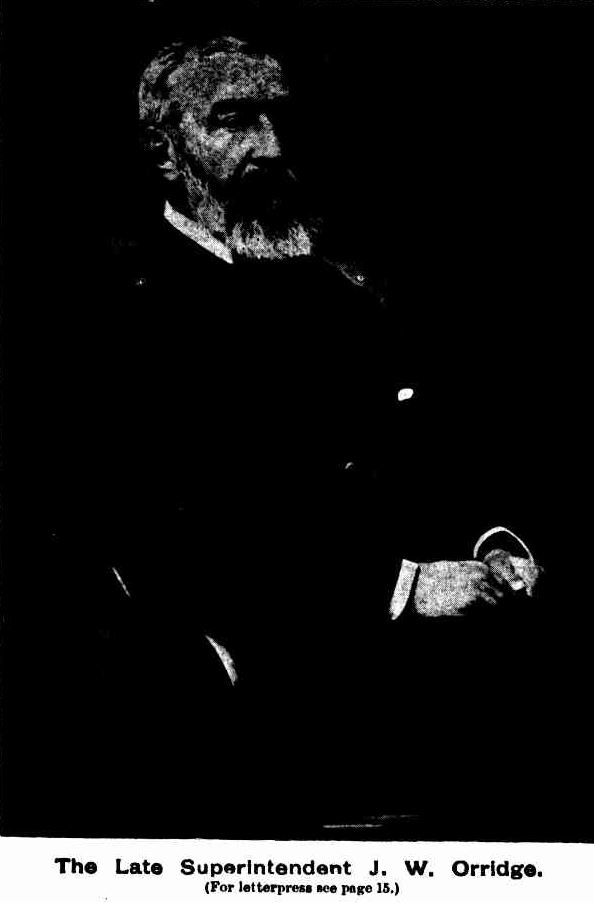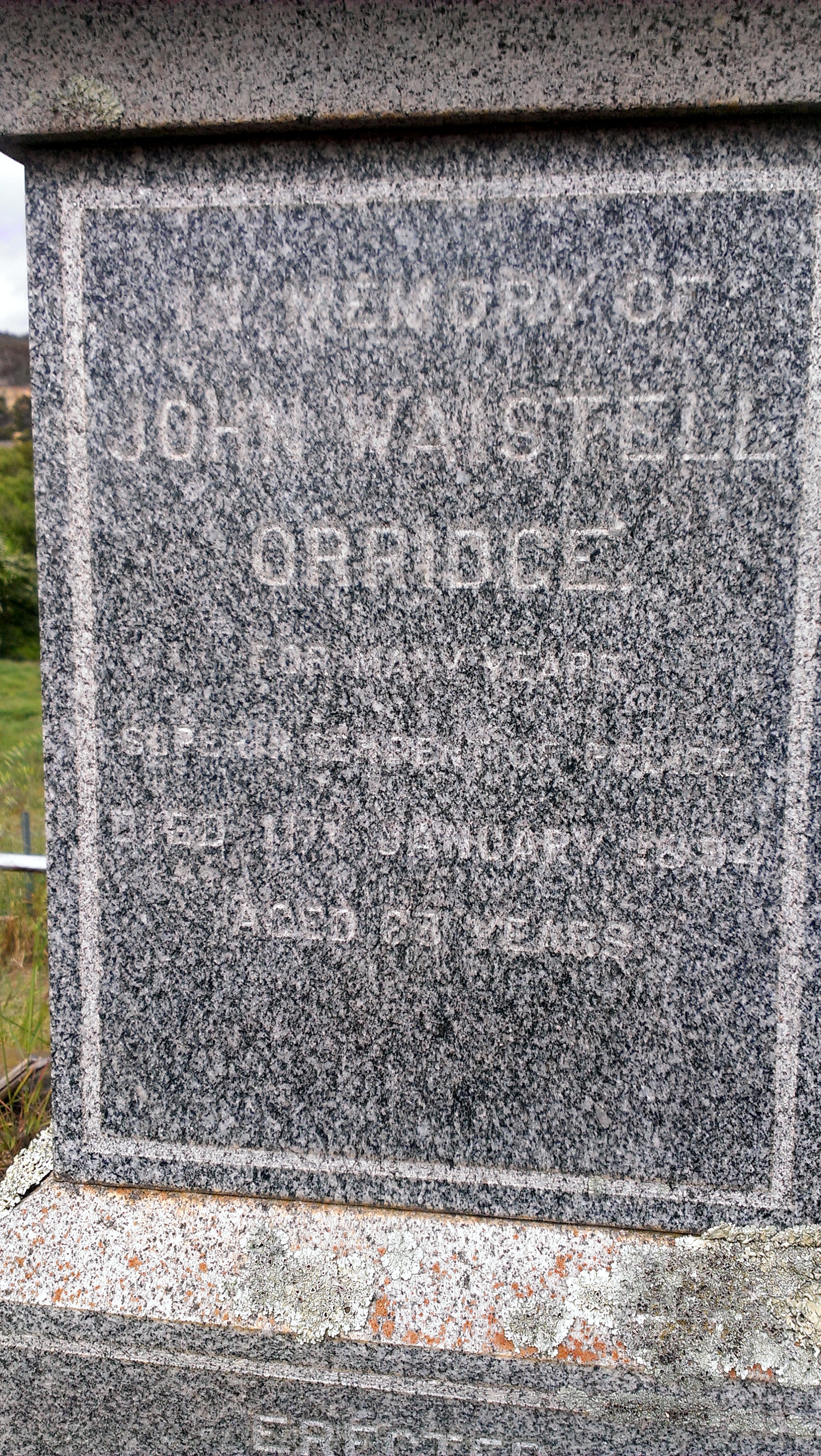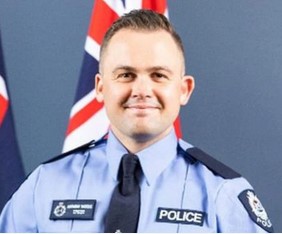John Waistell ORRIDGE
John Waistell ORRIDGE
New South Wales Police Force
Regd. # ?
Superintendent from 1 January 1864
Stations: Victoria,
Sydney Deport ( Redfern Academy ),
Braidwood – 1864,
Armidale (NSW ) – 1870,
Goulburn ( NSW ) – 1887
Born June 1830
63 old
Died 11 January 1894
Funeral ?
Buried St Saviour’s Cemetery, Cemetery Rd, Goulburn
directly opposite Goulburn Gaol
GPS -34.740938, 149.743984

Illustrated Sydney News Saturday 27 January 1894 page 6 of 40
Colonial Secretary’s Office.
Sydney, 2nd March, 1863.
His Excellency the Governor, with the advice of the Executive Council, has been pleased to appoint John W. Orridge, Esq., Inspector of Police, to be Acting Superintendent, and to the charge of the detective police force.
The Maitland Mercury & Hunter River General Advertiser Saturday 7 March 1863 page 6 of 8
DEPLORABLE ACCIDENT.— It is our painful duty to record the occurrence of a very serious accident to J. W. Orridge, Esq., the Superintendent of Police. He was proceeding to Major’s Creek on Saturday afternoon last, in company with Dr. Moreton, and was riding up to Durham Hall, the residence of Mr Hassall, at Jembaicumbene, when his horse shied at something and bounded off into the bush, rearing and plunging in a furious manner. The ( horse ) was very spirited, and Mr Orridge had that day for his first time, we believe, ridden him with a curb upon the bridle. Whether it was in consequence of the pulling too heavily upon the curb, or from whatever cause the animal while rearing up, fell right over on his back and came with his full weight upon Mr Orridge to the ground, crushing him in a dreadful manner. The horse immediately scrambled up and made off, Mr Orridge’s feet having got clear of the stirrups, and he being left mangled and bleeding in an insensible state. Dr Moreton immediately procured assistance from Mr Hassall’s and the sufferer was removed there, where he has since remained, and where he has had the most assiduous care and attention.
Dr Pattison and Dr Moreton have been in constant attendance upon him, and everything has been done for him that human efforts can do, but we regret exceedingly to state that very little hopes are entertained of his recovery. The full weight of the animal came upon his body and the internal injuries which he has sustained are of such a character that it will be a miracle if he gets over them.
The horse,which was shortly afterwards recovered, was found to have scarcely injured himself at all, and so completely did all his weight rest upon Mr Orridge, that the saddle was not damaged in the slightest degree. The horse prior to Mr Orridge purchasing him, had been in the possession of the bushranger Thomas Clarke, during a portion of his career on the highway.
The sad event has cast a gloom over the whole town and district wherever the intelligence has been conveyed. How forcibly are we sometimes reminded of the terrible import of the scripture precept, that in the midst of life we are in death, and that we know not what a day may bring forth.
– Braidwood Dispatch.
Queanbeyan Age Saturday 16 November 1867 page 3 of 4
Illustrated Australian News for Home Readers ( Melbourne )
Monday 23 March 1868 page 8 of 16
ATTEMPTED ASSASSINATION OF THE DUKE OF EDINBURGH: …………
SEIZURE OF THE ASSASSIN. While this painful examination was in progress another scene, which almost defies description, was going on in another part of the ground. No sooner had Mr Vial grasped the arms of the man who had fired the shots, than Mr Benjamin Mortimer ( an American gentleman ), Mr Whiting ( of the firm of Drynan and Whiting ), A. L. Jackson, and other gentlemen seized him ; and had it not been for the closing in around them of the police and other persons, they would speedily have placed him beyond the reach of the law courts. The people shouted “Lynch him,” “Hang him,” “String him up,” and so on, and there was a general rush to get at him.
The police, headed by Superintendent Orridge, got hold of the assassin, and they had the greatest difficulty in preventing, the infuriated people tearing him limb from limb. In this the police were ably assisted by the Chief Justice, Lord Newry, and the men of the Galatea band. Both Lord Newry and Sir Alfred Stephen exerted themselves to get the prisoner on board the steamer lying at the wharf, while Mr Orridge, with herculean strength, kept back the crowd as much as possible. The task of putting the prisoner on board the ship was not an easy one, and it was fully ten minutes before they could got him on to the wharf. By that time all the clothing from the upper part of his body was torn off, his eyes, face, and body were much bruised, and blood was flowing from various wounds ; and when he was dragged on to the deck of the Paterson he appeared to be utterly unconscious.
No sooner was he on board than a number of sailors had a rope ready to string him up, and it was only by the interference of Lord Newry that his life was spared. The people out of whose hands the prisoner had been rescued immediately gave vent to their disappointment, and at an indignation meeting, summarily convened, determined to bring him back from the steamer, and despatch him at the scene of his crime.
A rush was then made for the steamer, which had just hauled off a few feet from the wharf, and they shouted to the captain to haul in. For a moment this officer appeared to waver, but the hon. John Hay, who was on the bridge, doubtless divining the intentions of the crowd, peremptorily ordered the captain to haul off. This he did, and the vessel accordingly proceeded on her voyage to Sydney.
MARRIAGE. On the 16th instant, at St. Andrew’s Cathedral, by the Very Rev. Dean of Sydney, JOHN WAISTELL ORRIDGE, Esq., of Braidwood to EMELINE LESLIE, second daughter of the late HUGH GORDON, Esq., of Manar.
The Sydney Morning Herald
Friday 20 October 1871 page 1 of 8
THE LATE SUPERINTENDENT ORRIDGE.
( See portrait on page 6 )
John Waistell Orridge was born at Carlisle, in Cumberland, England, in June, 1830, reached Victoria in 1853, and shortly afterwards entered the police force there, obtaining rapid promotion to the rank of sub-inspector owing to his efficiency and courage. When the police force of this country was reorganised in 1862 Mr. Orridge was offered and accepted the position of inspector, being promoted to be superintendent at Braidwood in 1864.
The notorious Tommy Clarke managed to escape from Braidwood Gaol, where he was awaiting trial for horse-stealing. This escape put Mr. Orridge on his mettle, and for years he and his police were in pursuit of Clarke and his gang, then becoming very numerous. Murders and encounters with the police followed in rapid succession, bushranger after bushranger being shot. Houses were stuck up, stores robbed, and the whole district was in a state of terror. Clarke’s career of crime culminated in the murder of four men, warders of Darlinghurst Gaol, who volunteered to try and capture the outlaws, urged thereto no doubt by the reward of £500 offered by the Government. Finally Tommy Clarke and his brother surrendered, and to Mr. Orridge’s great relief were safely incarcerated in Braidwood Gaol, and afterwards forwarded to Sydney, where they expiated their crimes on the scaffold.
Subsequently Mr. Orridge was appointed to the charge of the escort of the Duke of Edinburgh, and was at Clontarf when Farrell made his attempt at assassination, and with difficulty prevented some of the leading men of the colony from stringing up the latter to the yardarm of the steamer.
Mr. Orridge was afterwards removed to Armidale, and in 1887 was transferred to Goulburn, where he died on the 11th instant. In 1871 he married the second daughter of the late Mr. Hugh Gordon, of Manar, near Braidwood, who with her two sons and two daughters survive him.
Illustrated Sydney News Saturday 27 January 1894 page 15 of 40
The Late Superintendent J. W. Orridge.
John Waistell Orridge was born at Carlisle, in Cumberland, England, in June, 1830, reached Victoria in 1853, and shortly afterwards entered the police force there, obtaining rapid promotion to the rank of sub inspector owing to his efficiency and courage. When the police force of this country was reorganised in 1862 Mr. Orridge was offered and accepted the position of inspector, being promoted to be superintendent at Braidwood in 1864.
The notorious Tommy Clarke managed to escape from Braidwood Gaol, where he was awaiting trial for horse-stealing. This escape put Mr. Orridge on his mettle, and for years he and his police were in pursuit of Clarke and his gang, then becoming very numerous. Murders and encounters with the police followed in rapid succession, bushranger after bushranger being shot. Houses were stuck up, stores robbed, and the whole district was in a state of terror. Clarke’s career of crime culminated in the murder of four men, warders of Darlinghurst Gaol, who volunteered to try and capture the outlaws, urged thereto no doubt by the reward of £500 offered by the Government. Finally Tommy Clarke and his brother John surrendered, and to Mr. Orridge’s great relief were safely incarcerated in Braidwood Gaol, and afterwards forwarded to Sydney, where they expiated their crimes on the scaffold.
Subsequently Mr. Orridge was appointed to the charge of the escort of the Duke of Edinburgh, and was at Clontarf when Henry O’Farrell made his attempt at assassination, and with difficulty prevented some of the leading men of the colony from stringing up the latter to the yardarm of the steamer.
Mr. Orridge was afterwards removed to Armidale, and in 1887 was transferred to Goulburn, where he died on the 11th instant. In 1871 he married the second daughter of the late Mr. Hugh Gordon, of Manar, near Braidwood, who with her two sons and two daughters survive him.
http://oa.anu.edu.au/obituary/orridge-john-waistell-14428
COUNTRY NEWS.
( FROM OUR CORRESPONDENTS )
DEATH OF SUPERINTENDENT ORRIDGE.
GOULBURN, FRIDAY.
Mr. J. W. Orridge, superintendent of police in the Goulburn district, died last evening. He joined the police service in 1862, and took charge of the Sydney depot as acting superintendent. In 1864 he was appointed to Braidwood, and took a prominent part in dealing with the Clarke gang of bushrangers. In 1870 he was transferred to Armidale, and in 1887 he came to Goulburn to succeed the late Superintendent Morrisset. Superintendent Orridge was popular with the men under his control, whom he encouraged in the pursuit of athletic sports. He leaves a widow, two sons, and 10 daughters. The funeral was attended by the Inspector-General of Police.
The Sydney Morning Herald
Saturday 13 January 1894 page 9 of 16
Orridge, John Waistell (1830–1894)
from Clarence and Richmond Examiner (NSW)
Mr. John Waistell Orridge, senior superintendent of the New South Wales police force, died at Goulburn at the ripe age of 63. During his connection with the police, extending over 31 years, Mr. Orridge was admired by the police and public. Previous to joining the New South Wales force, Mr. Orridge held the rank of sub-inspector in Victoria, but when the present Inspector-General took charge of the police department, well knowing the high qualifications of Mr. Orridge, he induced that officer to come over the border, and when Mr. Orridge entered on his duties he was placed in charge of the detective police, and made such headway that on January 1, 1864, he was appointed superintendent. He continued in charge of the detectives for some time. His first country appointment was at Braidwood, and he was in charge of that extensive district during the time the Clarkes held the country in terror, and it was under Superintendent Orridge’s directions to the courageous troopers under him that the brothers were run to earth. From Braidwood Mr. Orridge was transferred to Armidale, and at the death of Superintendent Morrisset in September, 1887, he succeeded to the charge of the Goulburn district, where he has since been stationed, and has done his duty well, and has now ended a life marked by great success. The deceased officer ranked next to the Inspector-General, Mr. Fosbery, who had known him ever since they joined the Victorian police together.











